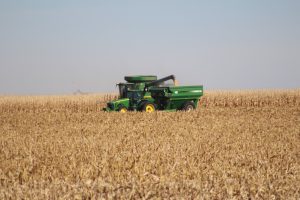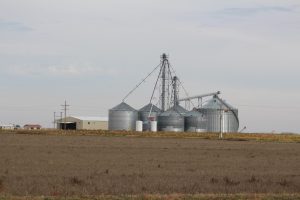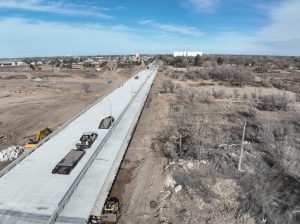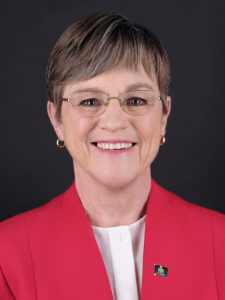K-State breaks ground on Agronomy Research and Innovation Center
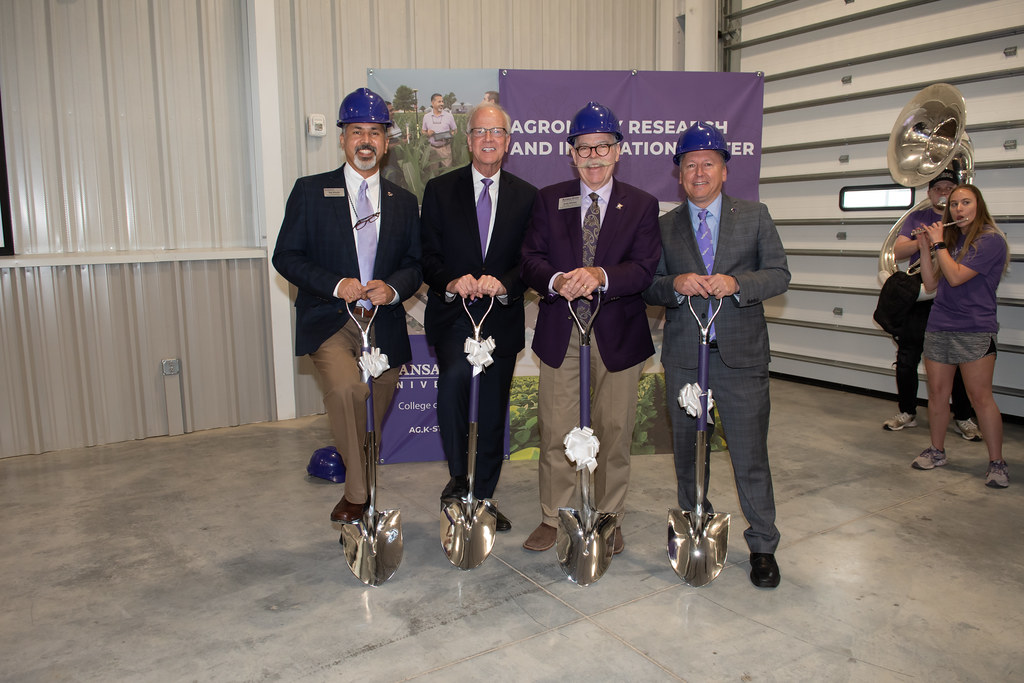
By Pat Melgares, K-State Research and Extension news service
MANHATTAN, Kan. — Hailing the occasion as “a significant milestone for Kansas State University and the entire agriculture industry in Kansas,” Gov. Laura Kelly joined state and national officials in a symbolic groundbreaking for the university’s Agronomy Research and Innovation Center on May 15.
The new facility, expected to be completed in 2025, will be located on the north end of the K-State campus, in an area known as the Agronomy North Farm across from Bill Snyder Family Stadium. It will serve as a cornerstone for work that K-State agronomy department head Raj Khosla calls “critical infrastructure for the success of our research, teaching and extension missions.”
“In the last 10 years alone, the Department of Agronomy has conducted more than $50 million of research that is initiated right here at the Agronomy North Farm,” Khosla said. “The new Agronomy Research and Innovation Center will bring research teams together from around campus to create new discoveries and solutions that will address the wicked challenges we are facing in agriculture today, and the ones that will come in the future.”
Ernie Minton, dean of K-State’s College of Agriculture, added: “The Center is a keystone for the college’s vision to strengthen and diversify agribusiness in Kansas and around the globe and will serve as a demonstration site for public/private partnerships focused on best practices in sustainable/regenerative agriculture, crop production innovation, technology development and training, and conservation and protection of natural resources.”
The May 15 groundbreaking marked K-State’s official kickoff of more than $125 million in agricultural infrastructure improvements planned through 2026. In Fall 2022, the university launched an ambitious campaign to raise $75 million toward campus projects, which include a Global Center for Food and Grain Innovation and improvements to the livestock competition area, Call Hall and Weber Hall.
K-State President Richard Linton said the university exceeded its goal, raising approximately $80 million in four months, which was then matched by a $25 million challenge grant from the Kansas legislature, and $25 million more from an initial legislative appropriation.
“We saw (the legislature’s contributions) as one of the smartest investments we could make in the future of our state,” said Kelly, noting that in 2022, Kansas reported $5.5 billion in agricultural exports, while supporting more than 250,000 jobs. “Said another way, right here in Kansas, we will be determining what agriculture… will look like for the next one thousand years.”
Linton said the four-month window in which the university raised its portion of the money “has never been done so quickly at K-State.”
“At K-State, we see this as a new way of thinking,” he said. “We think of infrastructure as a way of being an incubator for strong public-private partnerships where industry can work hand-in-hand with K-State researchers to leverage ideas and funding to move forward and develop the students of tomorrow. In doing so, we will create markets and jobs that are important for our stakeholders.”
“In turn,” he added, “this creates a better economy for all of us in Kansas. It’s a great example of realizing our vision of what we like to call the next generation land grant university. We are asking questions of what the interaction needs to look like between the next generation of land grant students and stakeholders. The project we begin today is a solution.”
Linton added that K-State continues to raise funds toward a projected $210 million in agricultural infrastructure improvements to nine facilities over the next several years. Thus far, the university has raised $140 million toward that bigger goal.
“No place in Kansas will succeed and have a bright future unless our farmers and ranchers have a bright future,” said U.S. Sen. Jerry Moran, one of the several supporters in attendance May 15. “One of the significant ways we can improve the lot and life of those who have a noble calling – feeding a hungry world – is to provide them with the knowledge they need to reduce their costs, become more efficient and produce more.”
Agricultural research is critical, Moran said, “and what is going on at K-State is a key that is opening a door wider and wider to agricultural producers, agribusiness and the state of Kansas economy.”
Khosla said some of the research projects planned for the K-State Agronomy Research and Innovation Center include:
- How to breed new crop varieties that are prolific and resilient to pathogens and the changing biome.
- How to extend the supply of water by studying the most efficient use of that resource in crops and forages.
- How to solve the “mystery of trillions of microbes that reside in soil” to improve soil health.
- How to use and co-create technology so that farmers of the future can produce more with less inputs.
“I’m so excited what this can do and what the future holds for agronomy and for the entire K-State campus,” Khosla said.



